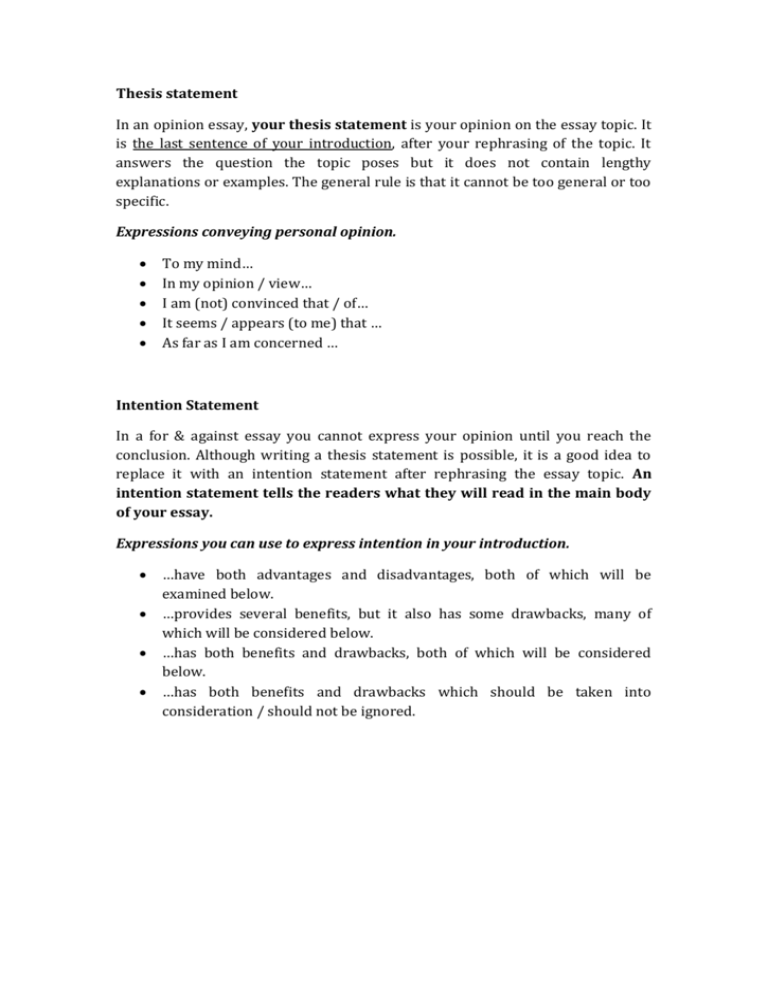introduction to essay writing
advertisement

Thesis statement In an opinion essay, your thesis statement is your opinion on the essay topic. It is the last sentence of your introduction, after your rephrasing of the topic. It answers the question the topic poses but it does not contain lengthy explanations or examples. The general rule is that it cannot be too general or too specific. Expressions conveying personal opinion. To my mind… In my opinion / view… I am (not) convinced that / of… It seems / appears (to me) that … As far as I am concerned … Intention Statement In a for & against essay you cannot express your opinion until you reach the conclusion. Although writing a thesis statement is possible, it is a good idea to replace it with an intention statement after rephrasing the essay topic. An intention statement tells the readers what they will read in the main body of your essay. Expressions you can use to express intention in your introduction. …have both advantages and disadvantages, both of which will be examined below. …provides several benefits, but it also has some drawbacks, many of which will be considered below. …has both benefits and drawbacks, both of which will be considered below. …has both benefits and drawbacks which should be taken into consideration / should not be ignored. Refuting the Opposing View One of the alternatives to giving three separate reasons to support your views in an opinion essay is to use the third main-body paragraph to present and refute the opposing view. This way your essay will be more complete and well-rounded. These are some of the most common expressions used to introduce an opposing view: It must be admitted, however, that… Opponents of …argue/claim that… It must be noted, however, that… There are those who argue that… It must be conceded that… And these are some expressions used to refute in opposing view: This can be easily averted / rectified, however, by… Although this is possible / true for some people / to some extent… In some rare cases…/Fortunately, (these cases are rare) …but it is worth mentioning that… Conclusion Summarise your views and end with an appropriate comment. Make sure you read your introduction again before you write your conclusion, so as to avoid repetition. Conclusion for opinion essays Summarise your views Restate your opinion End with a comment/warning/condition/wish/rhetorical question Conclusion for for & against essays Summarise your arguments State your opinion directly or indirectly or give a balanced judgement End with a comment / warning /condition/hope/rhetorical question Expressing opinion directly All in all,… Opinion indirectly/balanced judgement To sum up,… On balance,… In conclusion,… All things considered,… I feel/believe/think that… Taking everything into account/consideration,… It seems/appears that… I am inclined to believe that… It is clear /obvious that… I (do not) agree that/with… …has many benefits but its limitations should be taken into account (before/if) Although it cannot be denied that…, one should also bear in mind that… I am (not) convinced that… It is my opinion/belief that… Listing similar points First of all,… To begin with,… Secondly,… What is more,… Moreover,… Furthermore,… Finally,… The main/greatest advantage/drawback of…is… Another / an additional advantage/drawback of … is… Introducing disadvantages On the other hand, there are considerable disadvantages to… Despite its benefits,… also has several limitations / drawbacks Despite these advantages,… exhibits some limitations / drawbacks as well. On the negative side,… …,however, has its disadvantages Introducing supporting sentences To explain a point Introducing examples Showing result This means that For instance For this reason In other words For example As a consequence That is to say One striking/typical Because of this example of this is To put it another way Such as Therefore Meaning that Especially As a result This is illustrated by consequently LINKING WORDS AGREEING PARTIALLY To a certain extent/degree To some extent/degree In a way/sense This is partly true (but) There is some truth to(this) In some cases Up to a point To express intention So as to In order to So that With the intention of (+ing) To express cause Due to (the fact that) On account of On the grounds that Given that Because As / since To emphasize a point Clearly,… The fact of the matter is Actually In practice In effect Using various subjects Some/many/most people Experts/scientists/critics Proponents/governments Opponents/skeptics claim/suggest/argue/feel that maintain/believe/point out/agree advocate (+ing/noun) support/oppose the view that are in favor of / against are of the opinion that are convinced that







